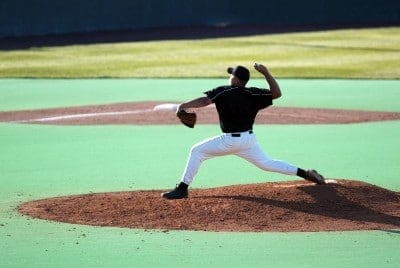
While full thickness rotator cuff tears are very common, let’s back up and start with the basics about these 4 little muscles. The rotator cuff plays a key role in the proper function of the shoulder. The four muscles which make up the “rotator cuff” are under a lot of stress. They need to maintain proper function of the shoulder. If the cuff sees too much stress they can become inflamed, or start to tear. Age or activity related degeneration can also leave our rotator cuff at risk of injury. The rotator cuff can be a source of pain for many many reasons.
Your shoulder pain can be due to:
- inflammation of the rotator cuff
- degeneration (tendinosis) of the rotator cuff
- tears of the rotator cuff.
Tears of the rotator cuff come in all shapes and sizes. Fraying of the rotator cuff tendon surface, partial thickness tears, and full thickness rotator cuff tears are all quite common. Interestingly, the degree of damage seen on the MRI does not predict how severe your pain will be. That means that there are some of you with small rotator cuff tears, or no rotator cuff tear, yet you have severe shoulder pain. On the other hand, there are many people with large full thickness rotator cuff tears who have very little pain. It can be confusing.
How do Orthopedists figure out which type of rotator cuff problem you have and how does that effect our treatment plan for your shoulder pain?
Rotator Cuff Tears:
Before we delve briefly into whether or not you have a full thickness rotator cuff tear (complete tear),you need to know what the rotator cuff is.
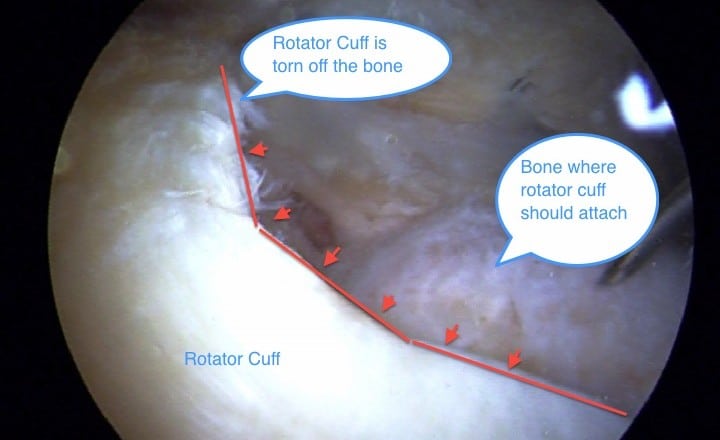
The rotator cuff is a series of four muscles, which combine at the shoulder to form a cuff of tissue completely surrounding the top of the arm bone or humerus.
Rotator cuff tears can be described in many different ways.
- There are traumatic tears (accident or a fall), acute tears (just happened)
- Chronic tears (present for a while, you just didn’t know it)
- Degenerative tears ( your tendon just wore out).
Rotator cuff tears can also be described as being partial, or full thickness. With partial thickness rotator cuff tears only part of the tendon has torn off the bone. With full thickness tears the entire tendon has separated or torn from the bone. Click here to learn about partial thickness tears.
Can you tell if you have a full thickness rotator cuff tear?
After a significant trauma such as a fall or a car accident, your rotator cuff tendon can literally pull right off the bone. We call that an acute, traumatic full-thickness rotator cuff tear. On the other hand, I see many patients in the office who do not recall any significant injury, but their exam and MRI demonstrate that they have a full thickness tear — why is that? The risk of developing a rotator cuff tear increases with age because our tendons begin to gradually wear, lose its blood supply and its resilience. In that situation, even routine daily activities like gardening or working around the house increase the potential for wear, degeneration, and tearing.
Whether your tear is chronic, attritional (wear and tear) or acute and traumatic (fall or injury) is a VERY important element of the decision-making process in how we treat full-thickness rotator cuff tears. Treatment decisions are based not only on the type of tear you have, but whether or not other treatments have failed, and how poor your quality of life is.
Rotator cuff tears, whether acute or chronic can cause severe pain. Many of you report temporary relief using:
- A shoulder ice sleeve
- A shoulder compression sleeve
- A Shoulder support pillow to help you sleep at night
- A sling to support the arm
Full thickness rotator cuff tears
Rotator cuff tears come in all shapes and sizes. Many patients have full thickness rotator cuff tears and do not even know it. As a matter of fact, by the time you reach 65 you have more than a 50% chance of having a degenerative rotator cuff tear because of wear and tear. No need to panic…
>How can Orthopedic Surgeons tell if you have a full thickness rotator cuff tear?
Shoulder Pain:
Does the amount of pain you are having correlate with the size or thickness of your rotator cuff tear?
The size of the tear usually doesn’t correlate with the pain you are experiencing. Many patients mistakenly believe that they must have a large full thickness rotator cuff tear because they are in severe pain … usually, the opposite is true. Many patients with severe shoulder pain have very small full thickness rotator cuff tears, partial thickness rotator cuff tears, or no tear at all. Yet some patients with mild shoulder pain have massive rotator cuff tears. Bottom line… the size of your tear will not correlate with the amount of pain you are experiencing. Many patients with tendonitis or bursitis have more pain than patients with rotator cuff tears. Many patients with tendinosis, small tears, large tears or just bursitis usually have very severe pain at night. Night pain can be very disruptive, aggravating and demoralizing. Night pain is frequently the reason many patients cite why they opted for surgery to repair a full thickness rotator cuff tear.
Weakness:
The rotator cuff muscles control the motion and the overall strength of the shoulder. Small tears do not produce shoulder weakness, however, large or massive tears can produce very significant shoulder weakness.
Patients with large rotator cuff tears complain of weakness and the inability to place the arm in certain positions. They have difficulty taking milk out of the refrigerator and may need to support their injured arm with their other arm when attempting to lift something.
Loss of motion:
Most rotator cuff conditions which produce pain will lead to loss of motion. Many patients with rotator cuff related pain will complain of difficulty with hair care, putting on a bra or belt, and weakness when trying to lift the arm away from the side. Sometimes patients with full-thickness tears will have significant loss of motion, and sometimes patients with large rotator cuff tears will have normal motion. That means that loss of motion, in general, is a poor predictor in and of itself of the presence of a full thickness rotator cuff tear.
A thorough physical examination by a Sports Medicine trained specialist is usually necessary to determine whether a rotator cuff tear is present.
Ultimately an MRI or an ultrasound may be necessary to confirm the presence and size of a rotator cuff tear and determine if it is partial thickness or a full thickness rotator cuff tear.
Whether you have a full thickness tear or a partial thickness tear, your shoulder pain may be so severe that your quality of life is very poor. You’re not sleeping well and you have very limited use of your arm. Not all rotator cuff tears require surgery… but some do.
There are affiliate links on this page. Please see my disclaimer
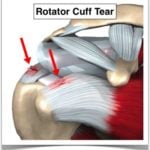


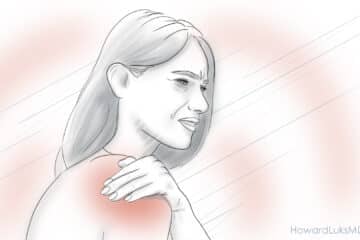
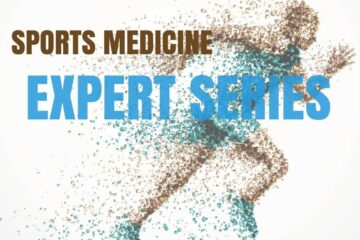









53 yo F, overweight, low level of exercise. I fell about 6 weeks ago. Tried chiropractor twice but pain continued, so I saw a NP at the orthopedic dr. that has done 6 surgeries on my feet and ankles (torn achilles X2, heel spurs, broken foot), so I am a fairly regular pt. MRI said “focal high grade near full thickness tear involving the anterior fibers of the supraspinatus tendon measuring 8 mm in size and partial thickness interstitial tearing involving the superior fibers of the subscapularis tendon”.
I was not able to see the Dr, just the NP, but she said he recommended PT and come back in a month. Pain is tolerable and near constant. ROM is limited.
Can PT fix this? Or am I just wasting time before the inevitable? About 30 years ago, I tore the other RC and had surgery on it, and it was no where near as painful, although ROM was worse.
Thanks in advance.
PT can result in resolution of your pain… and PT for these small degenerative rotator cuff tears is the recommended first step in treatment.
Hi – was reading through some of these – 27 year old here, fell hard on my shoulder during a tough mudder event.. below my shoulder blade some scratches but no bruising.. i believe it could be my infraspinatus… injury happened on 8.19 – have full motion although some motions do cause some pain.. i figured i should try and rest, no lifting heavy things and some icing.. am i right to wait a week or two and see if it improves? or should i be doing some stretching or anything?
thanks
Am 40 age male,playing football twice a week.while playing on last january 25th 2019 ,i fall down and after 30 minutes paining starts on shoulder.. kept ice full night.morning i cant lift my left hand..
consult doctor .he told rotatory cuff is injured
ultra sound scan result is as follows😢😢
—————supraspinatus tendon shows full tickness tear anteriorly with tendon retraction of upto 1cm and
bursal surface partial tear posteriorly
—————–subscapularis and infraspinatus tendond are intact
—————–long and short head of biceps are intact.biseps tendon is well seated intertubsecular
groove
doing some physiotherapic exercise
still civiar pain while sleeping and cant lift horizntaly
what is the next to do?
if surgery
How long does it take for rotator cuff to heal
please help
The recovery from a rotator cuff repair can take many months. The tendon starts to heal within 6-8 weeks but it takes much longer until it starts to get back its near normal strength.
Dr,
I was diagnosed with a full tear of Supraspinatus in right shoulder. Dr say’s not sure he can repair. He went on to say that replacements( both Flavors) have no better odds of repair. Question: Would (Superior Capsular Reconstruction) SCR be an option?
Thanks
Hi Michael, Many isolated supraspinatus (SST) tears can be repaired. An SCR is usually reserved for those with a larger defect… however I’m sure there are docs performing an SCR for an irreparable SST. Then again, based on your age, activity level and so on that may or may not be a good option for you. I would virtually never recommend a reverse, hemi, or total shoulder for someone with an isolated SST tear.
Hi – i am a 64 year old female who is very active. Golf, yoga, hiking, etc. I’m scheduled for surgery Sept. 4, 2019. My MRI dated June 29 shows a “1cm full-thickness tear or extremely high grad partial-thickness tear of the critical zone of the supraspantus tendon”. My Ortho says it is a full thickness tear. This most likely happened from playing golf. Started having pain in my left shoulder about a month prior to the MRI, tried to ignore it and pushed myself through it. I have done some PT, no injections and have had steady improvement of pain, ROM and weakness. However my ROM is still limited and I still have weakness. I don’t have a lot of pain, unless I overdue it. More soreness and deep aches than anything. Although I do have a “hot spot” where the long head of the biceps tendon intersects with the suprspantus tendon. I’ve also consulted with two regenerative specialists that in reviewing my records and looking at the area via ultrasound feel I would benefit from Stem Cells/PRP. They both agreed that it was a full tear but one said it was a .2 cm retraction and the other said minimal retraction. They felt that there was a good chance the tendon could heal with biologics. What are your thoughts on this? Would like to avoid the surgery if at all possible but also want to get back to golf and my active lifestyle and be able to function normally. Is the surgery necessary? My surgeon says I have a 95% success rate if I fix it now otherwise I risk tearing it further in the future with less of a chance to heal. He feels it’s best to get it done now because I am so active. Thank you for your consideration!